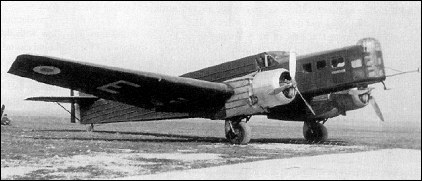|
| The Bloch 210.01 prototype flew for the first time in June 1934. It was intended as a twin-float seaplane bomber for the French Navy. A second prototype was designated Bloch 211 N°1 Verdun. Following tests, the production version was ordered as the Bloch 210. A cantilever low-wing monoplane which retained the angular lines of the high-wing Bloch 200, the Bloch 210 was powered by two 678kW Gnome-Rhone 14N engines and had a retractable landing gear, the main units of which retracted into the engine nacelles. Armament comprised single 7.5mm MAC machine-guns in a nose turret and semi-retractable dorsal and ventral positions. Maximum bomb load was 1,730kg.
The first production machine flew on 10 December 1935. A total of 283 were eventually built for the Armee de l'Air, with which they served in the BN5 (five-crew night bomber) category. Final deliveries to the air force were made in February 1939, by which time the aircraft was obsolete.
By September 1939 238 Bloch 210s served with French bomber Groupes, employed on limited night operations including leaflet raids. However all were withdrawn from first-line service by June 1940. Twenty-four Bloch 210s had also been exported to Romania in 1938 and the Spanish Republicans had received several. Ex-Vichy aircraft were supplied by the Germans to Bulgaria in 1942.
| WEIGHTS |
| Take-off weight | 10200 kg | 22487 lb |
| DIMENSIONS |
| Wingspan | 22.81 m | 75 ft 10 in |
| Length | 18.9 m | 62 ft 0 in |
| PERFORMANCE |
| Max. speed | 334 km/h | 208 mph |
| Range | 1100 km | 684 miles |
| Klaatu83, e-mail, 03.08.2015 02:33 Yet another of the many interwar French aircraft that seem to have been designed with nothing but a straight-edge ruler. The French designers of that era don't seem to have gone in much for curved lines, let alone the principals of aerodynamic streamlining. reply | | DrP, e-mail, 09.07.2010 00:20 what are the colors ? reply | | Jean Claude SALLES, e-mail, 14.12.2008 22:36 Je confirme que cet appareil était bien surnommé "le cercueil volant"; mon père (bientôt 90 ans) sergent mécanicien de bord s'est crashé le 10 mai 1940 à Istres. Il appartenait au Groupe de Fos; l'élève pilote avait été tué, le pilote et le mécanicien blessé. Cette version était sous motorisé et en virage trop prononcé la nourrice se désamorçait : moteur désalimenté, c'était le crash assuré ! reply |
| Petr Vojtíek, e-mail, 10.03.2007 15:27 Hi, I´m a plastic kit maker fromCzech republic and I¡m looking for some detail photo or pictures of the Bloch 210.
Especially interior, bomb bay,engines, weapoins.... If you have some, you will be VERY nice to send me them by my mail: vojtisek.p@volny.cz reply | |
| | Yves REYNIER, e-mail, 20.01.2007 23:40 Hi,
For your information, my father, who was pilot on the Bloch 210 in the French Air Force during the WWII, tell me that the nickname of this plane was "Le cercueil volant" ("The flying coffin") because many crash occured due to the weakness and the failure of its engines.
Sincerely, YR reply |
|
Do you have any comments?
|
| 
COMPANY
PROFILE
All the World's Rotorcraft
|







20
reply